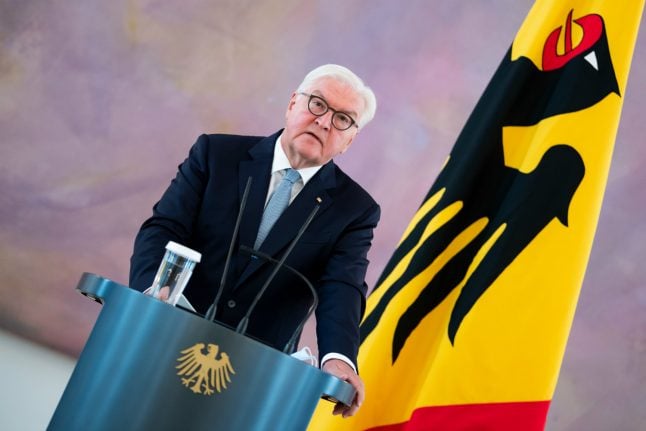Steinmeier said people must be supported during their grief following the deaths connected to the coronavirus pandemic in Germany.
So far, more than 9.300 people have died after contracting Covid-19 in Germany.
“The corona death is a lonely death,” Steinmeier told the Redaktionsnetzwerk Deutschland in an interview at the weekend. Many patients in hospitals and old people's homes died without the support of their relatives, and the bereaved could not say goodbye, he said.
“We must help people in their grief – and think about how we can express our sympathy,” Steinmeier said. He plans to discuss with authorities about the possibility of a state memorial ceremony.
“We have 9,300 dead to mourn,” said Steinmeier. That is lower than elsewhere, he added. “But in six months it is three times as much as the annual traffic fatalities. We should not overlook that.”
READ ALSO: Pandemic 'not war but test of humanity': German president
'There is light at the end of the tunnel'
Steinmeier revealed his positive attitude during the interview.
“We will defeat the virus,” he said. “And I hope that we will then look back on this crisis with the certainty that we may not always have done everything right, but that we have done everything possible together to protect the health and lives of people in Germany.”
The president said he found the reports about promising research on vaccines “quite encouraging”.
“There is light at the end of the tunnel – but we don't know how long the road ahead will be,” he said. “Therefore, we must not slacken in our efforts and discipline.
“The virus will not take the future from us. There will be a time after Corona, and that is what we have to focus on now.”
READ ALSO: 'Shops won't close again': German health minister rules out second coronavirus lockdown
He said the world would look different after coronavirus, and called for a “better normality” rather than a return to old ways.
“The crisis has brought out the worst and the best in us humans,” he said. “And, yes, I wish that we take as much of the positive things we have experienced as possible with us into the time after corona.
“Consideration, solidarity, cohesion, responsibility for others – all this is not a matter of course, precisely because the level of personal concern was lower than elsewhere.
“Only 11 percent of Germans know someone infected with the virus; in Italy the figure is three times as high, in Great Britain four times as high. It is both astonishing and gratifying to see how quickly the insight has grown that we will not overcome the pandemic as individualists – but only if we are prepared to help each other.”
'We should commemorate victims as a society'
Health Minister Jens Spahn backed the call to honour people affected by the virus. During an online broadcast by Bild newspaper on Sunday he said it was right that “we, together as a nation, as a society” commemorate victims.
It is important to show “that we perceive what hardships, what suffering there was and partly still exists today,” he said.
A service by the state for victims of the epidemic in Germany should also be dedicated to everyone who suffered during the crisis, said Spahn.
In July, Angela Merkel's chief of staff, Helge Braun, called for a service similar to the one staged in Spain.
Spain formally honoured its coronavirus victims on July 16th with a ceremony attended by top EU and World Health Organisation figures.
There have been a total of 250,799 confirmed cases in Germany since the pandemic begin, with more than 800 new cases within 24 hours reported on Monday, according to the Robert Koch Institute (RKI)
However, there are usually lower numbers of new cases at the weekend and on Monday because not all health authorities transmit data to the RKI on weekends.




 Please whitelist us to continue reading.
Please whitelist us to continue reading.
Member comments